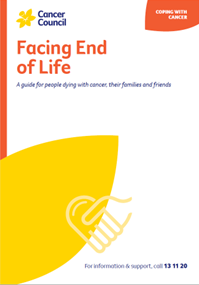- Home
- Cancer Information
- Advanced cancer
- Facing end of life
- Common questions about dying
- What is dying going to be like?
What is dying going to be like?
You may start to think about what the last few days or hours of your life will be like. It’s common to have fears about the process of dying. But many people say they worry about the unknowns of dying more than actually fearing death. Having some idea of what to expect can help some people. Not being prepared, or imagining what might happen, can be distressing for you and for your family and friends too.
If you have been with someone when they died, the experience will influence how you feel about dying. It may have left you reassured, thoughtful, sad, angry or scared. You may have been disturbed by some of the physical changes that happened to the person. Perhaps it appeared that they were having trouble breathing, or they seemed to be in pain or uncomfortable.
Talk about what you can expect
When you feel ready, it may help to talk to a doctor or palliative care staff. They can explain the physical process of dying and reassure you that you will be cared for. You may not be aware of physical changes if you are drowsy or unconscious.
Make a plan with your health care or palliative care team
Ask what support they will provide for symptoms, and discuss it with your family, for reassurance and support. You may also have specific concerns. For example, if they know you are worried about pain, they can talk to you about what options there are and prepare a pain management plan. Knowing you will have relief may help to put your mind at ease.
Control pain and distress
Modern health care means that pain can usually be well controlled. If you have symptoms of pain or distress, you or your family can ask your doctor for help. Learn about the physical process of dying in more detail.
When patients ask me about the dying process, I describe it as the physical and emotional experience of gradually becoming weaker and letting go of their attachment to living.
Nurse
Podcast: Living with Dying
Listen to more episodes of our podcast for people affected by cancer
Prof Jane Phillips, Head, School of Nursing and Professor, Centre for Healthcare Transformation, Queensland University of Technology and Emerita Professor Palliative Nursing, University of Technology Sydney, NSW; Prof Meera Agar, Palliative Care Physician, Professor of Palliative Medicine, University of Technology Sydney, IMPACCT, Sydney, NSW; Sandra Anderson, Consumer; A/Prof Megan Best, The University of Notre Dame Australia and The University of Sydney, NSW; Prof Lauren Breen, Psychologist and Discipline Lead, Psychology, Curtin University, WA; David Dawes, Manager, Spiritual Care Department, Peter MacCallum Cancer Centre, VIC; Rob Ferguson, Consumer; Gabrielle Gawne-Kelnar, Counsellor, Psychotherapist and Social Worker, One Life Counselling & Psychotherapy, NSW; Justine Hatton, Senior Social Worker, Southern Adelaide Palliative Services, Flinders Medical Centre, SA; Caitlin MacDonagh, Clinical Nurse Consultant, Palliative Care, Royal North Shore Hospital, Northern Sydney Local Health District, NSW; McCabe Centre for Law and Cancer; Palliative Care Australia; Belinda Reinhold, Acting Lead Palliative Care, Cancer Council QLD; Xanthe Sansome, National Program Director, Advance Care Planning Australia; Kirsty Trebilcock, 13 11 20 Consultant, Cancer Council SA.
View the Cancer Council NSW editorial policy.
View all publications or call 13 11 20 for free printed copies.
Need to talk?
Support services
Support for carers
Speak to a health professional or to someone who has been there, or find a support group or forum
Cancer Council Online Community
A community forum – a safe place to share stories, get tips and connect with people who understand
Cancer information
Advanced cancer
Information for all stages of advanced cancer, from the initial diagnosis to palliative care and grief
Information for carers
Information for family and friends providing care to someone at any stage of cancer
